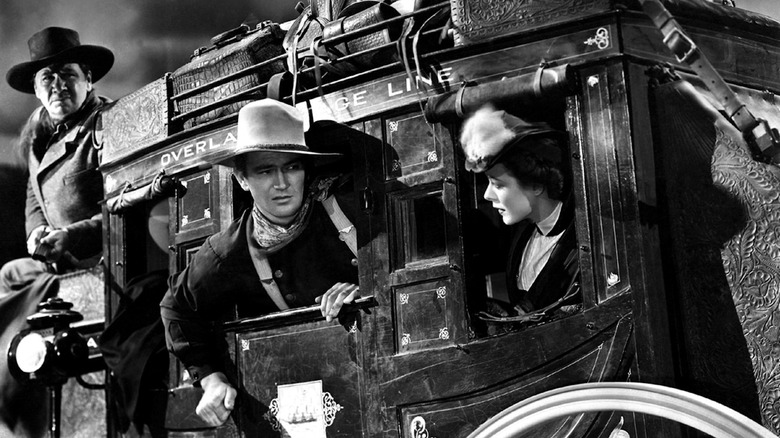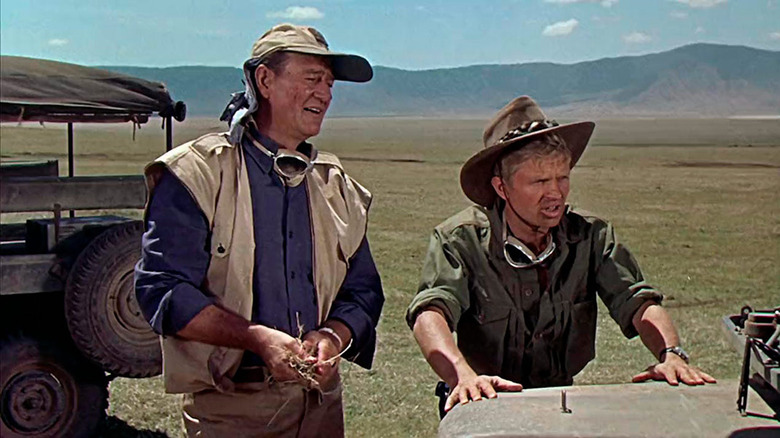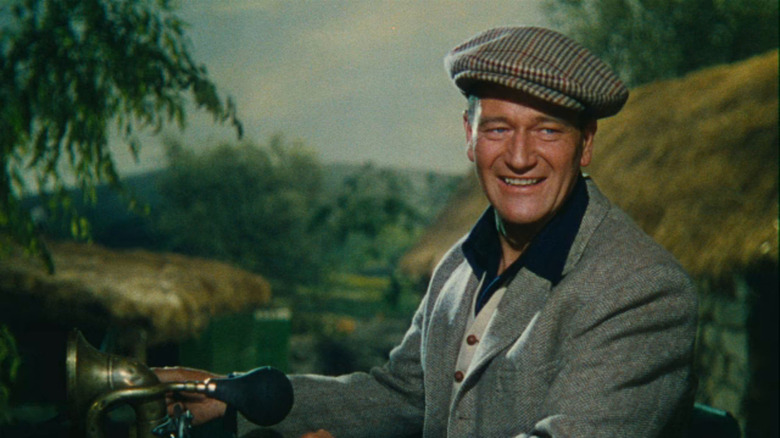John Wayne Named These Three Roles As His Favorite To Play
The end was in sight for John Wayne when he took the part of aging gunfighter J.B. Books in Don Siegel's 1976 Western "The Shootist." He was only 69, but the quintessential American movie star hadn't been nice to his body. Decades of drinking and smoking had taken their toll. He'd lost a lung and a couple of ribs to cancer in the 1960s, but had evidently been in remission since. Still, his energy was flagging. He'd struggled throughout the filming of "Rooster Coburn," and was being asked to literally hop back on a horse in the elevated altitude of Carson City, Nevada. He had not been diagnosed with a return of the cancer that would kill him three years later, but The Duke looked a deathly shadow of his former, swaggering self.
Culturally, there was a sense that people should celebrate Wayne while he was still around (for those willing to venerate a relic of a man who dodged service in World War II and expressed support for "white supremacy" in an infamous 1971 Playboy interview). So when "The Shootist" ambled into theaters on August 20, 1976, Wayne hit the publicity trail one last time and communed with his audience. One such meeting was captured on "The Phil Donahue Show," where an audience packed with elderly Midwestern women peppered their wheezing big-screen crush with the most innocuous of questions. One, however, was quite revealing.
A stagecoach, a safari, and a load of blarney
At the 20-minute mark of Donahue's show, a shy, gray-haired lady rises to ask The Duke, whom she addresses as "sir," to name his three favorite movies. Wayne responds with his trademark brevity:
"Well you like different pictures for different reasons. I loved 'Stagecoach,' naturally, because I stepped on that stagecoach and it's carried me a long ways. I liked 'Hatari!,' which is a picture we made in Africa because I had a three month safari free. I mean, rich men don't get that you know? And 'The Quiet Man' because I got to work with all of the Abbey Players and some forebears of my own family."
"Stagecoach" is a no-brainer. Wayne rocketed to stardom as Winchester-wielding The Ringo Kid in John Ford's groundbreaking Western. But it's curious that he singles out "Hatari!," one of his most frivolous efforts with director Howard Hawks over "Red River" and "Rio Bravo." His portrayal of Ahab-esque rancher Thomas Dunson in "Red River" ranks among his very best. Hawks uses Wayne's my-way-or-the-highway certitude against Wayne. Montgomery Clift usurps his management of the cattle drive, and is proven right in the end. But I've seen "Hatari!," and while I'm not a fan, it looks like it was a blast to shoot. If that's what mattered to the Duke, so be it.
A tarnished man of a tarnished people
At the time of the Donahue interview, Ford's "The Quiet Man" was one of the most beloved movies ever made. It's an Irish romantic-comedy stuffed to bursting with all that entails: there's drinking and brawling and smooching and loads of verdant, windswept scenery. Wayne and Maureen O'Hara strike up a wonderfully quarrelsome chemistry that leaves you laughing and swooning. Just listen to that applause from the Donahue audience the minute he says the title: Wayne's people love "The Quiet Man."
But what did they think of "The Searchers" or "The Man Who Shot Liberty Valance?" Did they appreciate their revisionist, anti-heroic qualities? Did they even register them? They're all quite dead now, and, given that America is caught in the throes of a nativist rebirth, it's likely the racism of Ethan Edwards in "The Searchers" was either lost on them, or, worse, palatable. But Wayne, because he trusted Ford and Hawks, allowed his patriotic image to be tarnished for the sake of telling a good story — and, perhaps, telling an ugly story he understood, but couldn't bring himself to publicly acknowledge.


